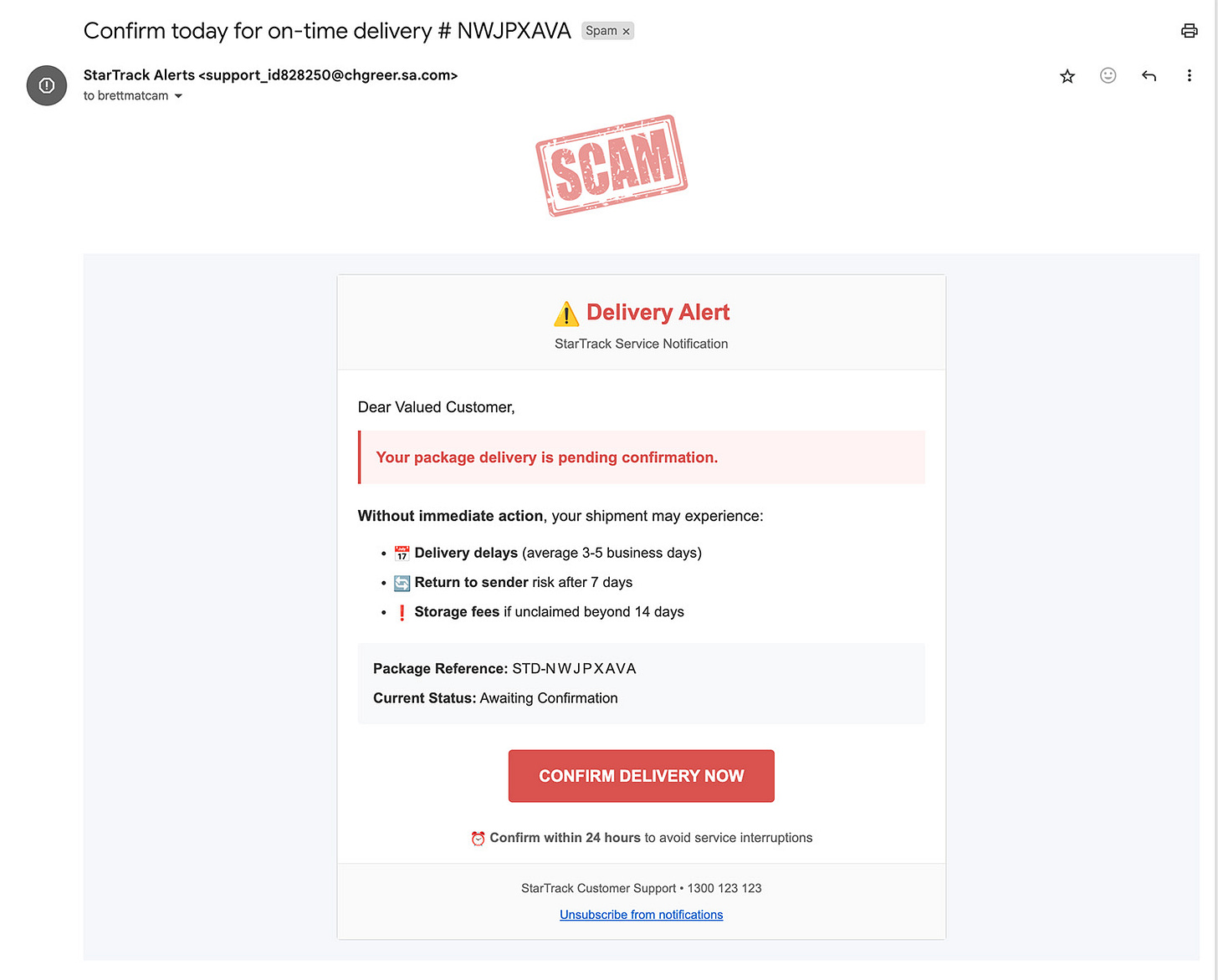Hoax-Slayer - Issue 11
AI free zone, Social Security and delivery scams and the lovely old car park hoax
Hoax-Slayer is Now an AI Free Zone
“There was a whole chain of separate departments dealing with proletarian literature, music, drama, and entertainment generally. Here were produced rubbishy newspapers containing almost nothing except sport, crime, and astrology, sensational five-cent novelettes, films oozing with sex, and sentimental songs which were composed entirely by mechanical means on a special kind of kaleidoscope known as a versificator.”
― George Orwell, 1984
AI is everywhere. I fluctuate between awe at what this new and rapidly evolving tech can already do, and trepidation about what it may do to us in the future.
The technology is compelling and enticing. It draws you in. I’ve toyed with it. Dipped my toes into its deep and mysterious waters. After all, what’s the harm in dropping an article you’ve written into ChatGPT and asking it to create a more refined and readable version?
Or, maybe I should go all in and get ChatGPT to write the entire damned article for me and be done with it? And ask it to create a compelling and on-point image to go with the article while I’m at it?
That’s going to benefit my readers, right? Give them a better user experience and save me some time as well. Because, well, it’s hard to admit, but ChatGPT writes better than I do.
But, that said, here’s the bottom line.
Using AI makes me feel bad.
It makes me feel like I’ve done something a little shameful that I wouldn’t want my mum to know about. It makes me feel inauthentic. When I relize that something that I’ve read and enjoyed was created with AI I feel like one of Orwell’s hapless proles who has dicovered that the catchy, heartfelt love song she been listening to was created by a souless machine. I feel duped and manipulated.
So I’m taking a stand. This little publication is now a totally AI-free zone. Maybe my writing is a little unrefined and grammatically challenged at times. But, at least you’ll know that every word here is written by a real human with a beating heart.
I know that AI is here to stay and will become more and more integrated into our daily lives, like it or not. I’m certainly not judging anybody else for using the technology.
But, going AI-free feels intuitively right for me, and I’m going with that.
Watch For “Social Security Statement” Scam Emails
Scam emails purporting to be from the US Social Security Administration are currently hitting inboxes.
The emails, which include the Social Security Administration logo, urge you to click a button to download your Social Security statement. Supposedly, the download contains information about your earnings and benefits.
The email warns that the files cannot be accessed on a phone and must be downloaded on a laptop computer.
The emails have no connection to the Social Security Administration, and the download does not contain financial records.
Instead, downloading the file will install a tool that gives criminals remote access to your computer. Once installed, the software allows criminals to take control of your computer and steal sensitive information such as banking details, financial files, and ID documents.
Using this stolen information, the criminals can hijack your bank and other accounts and steal your identity.
If you receive one of these scam emails, do not click any links or open any attachments that it contains.
It is always safest to access your online accounts by entering the address into your browser address bar or via an official app.
A screenshot of the scam email:
Bristol Zoo Car Park Attendant Hoax
This old tale tells of a clever conman who illegally collected money from visitors to Bristol Zoo in the UK by pretending to be a car park attendant.
Supposedly, the conman collected parking fees from visiting cars and coaches because the zoo assumed that he was employed by the local city council. The story claims that, over 25 years, he made around £3.6 million before absconding to Spain to retire in luxury.
The message claims that the fraud was only uncovered when the attendant failed to appear one morning, and zoo management contacted the council to arrange a replacement.
It is certainly a deliciously amusing tale. Stories of canny swindlers tend to generate a lot of public interest, but in this case, there is not a shred of truth to the tale. The story is a hoax that has been circulating via email, social networking, and even a few news and entertainment media outlets for many years.
A June 2009 article in Bristol’s Evening Post newspaper notes:
Touted as a genuine news article, the tale of a Bristol Zoo parking attendant who lined his own pockets with customers’ cash for 23 years before going missing with the loot has set cyberspace alight.
But the Evening Post can confirm the story, which has been emailed to thousands of people across the globe in recent months, is nothing more than an urban myth – and the real attendants say the joke is starting to wear thin.
Our newsroom, as well as the offices of Bristol Zoo, has been inundated with messages asking if the story is true, particularly as some versions say it has recently appeared in the Evening Post.
Management at Bristol Zoo Gardens has denied that there has ever been any confusion about which entity controls car parking attendants. Information on the zoo website notes:
Parking is free of charge but we advise booking your admission ticket in advance during peak periods to avoid disappointment.
Moreover, it is absurd to suggest that even the most dedicated swindler could have managed to turn up for “work” seven days a week for 25 years. Surely over such a time period, the bogus attendant would have taken at least a few days off due to illness or even pure boredom.
The Evening Post notes that it published a version of the tale in 2007 as part of an article about urban myths timed to coincide with April Fools’ Day.
An example of the hoax message:
Outside Bristol Zoo there is a carpark for 150 cars and 8 buses. For 25 years, it’s parking fees were managed by a very pleasant attendant. The fees were £1.40 for cars and £7 for buses. Then, one day, after 25 solid years of never missing a day of work, he just didn’t show up; so the Zoo Management called the City Council and asked it to send them another parking agent. The Council did some research and replied that the carpark was the Zoo’s own responsibility. The Zoo advised the Council that the attendant was a City employee. The City Council responded that the carpark attendant had never been on the City payroll.
Meanwhile, sitting in his villa somewhere on the coast of Spain or France or Italy … is a man who’d apparently had a ticket machine installed completely on his own and then had simply begun to show up every day, commencing to collect and keep the parking fees, estimated at about £560 per day — for 25 years.
Assuming 7 days a week, this amounts to just over 5 million pounds … and no one even knows his name.
Haha.. brilliant!!
Fake Shipping Fee Delivery Scams
A favorite scammer ruse is to send out fake emails claiming that a package delivery has failed or needs your attention. The emails purport to be from well-known delivery companies or postal services. The messages are designed to trick recipients into divulging their personal and financial information.
In one common version of the scam, the emails ask you to pay a small fee, ostensibly to rectify a delivery problem and ensure the timely arrival of your package. People may be more likely to fall for this scam because the amount requested is so small.
The following screenshots show how the scam works. This version targets users of the Australian-based delivery service StarTrack. However, very similar versions target many other delivery services around the world.
You receive an email claiming that a package being sent to you is pending confirmation. It asks that you click a button to confirm:
Clicking the link opens a bogus website that claims you need to pay a shipping fee of $1.95.
Clicking the “schedule delivery” button opens a payment form that asks for your name and contact details, and your credit card numbers.
After you submit these details, you will be taken to a fake “success” page that claims your package has now been scheduled for delivery.
But, alas, online criminals can collect the information you submitted and use it to commit credit card fraud and identity theft.
Be wary of any email or text message that claims there is a problem with an upcoming parcel delivery.










